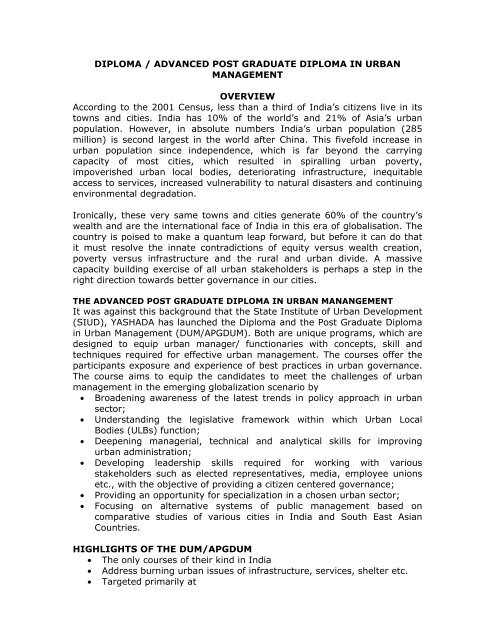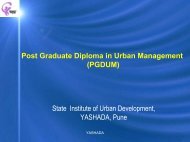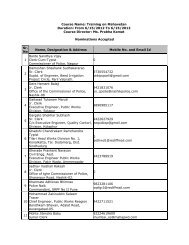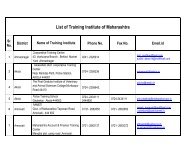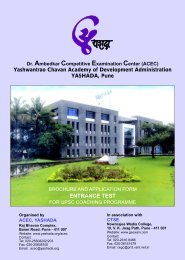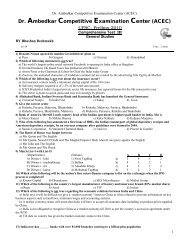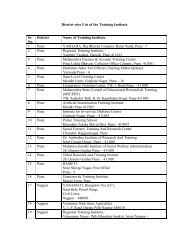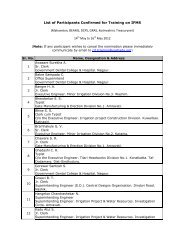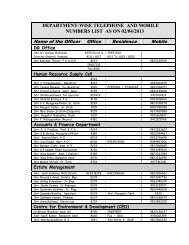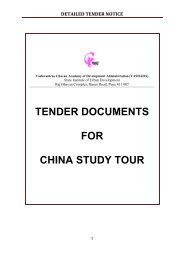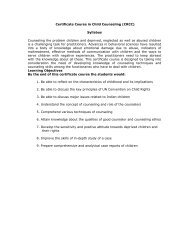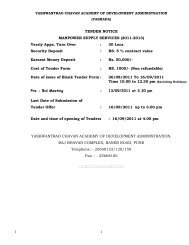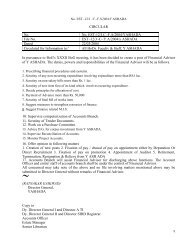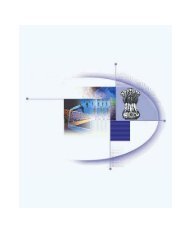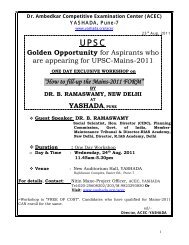Brochure - yashada
Brochure - yashada
Brochure - yashada
You also want an ePaper? Increase the reach of your titles
YUMPU automatically turns print PDFs into web optimized ePapers that Google loves.
DIPLOMA / ADVANCED POST GRADUATE DIPLOMA IN URBANMANAGEMENTOVERVIEWAccording to the 2001 Census, less than a third of India’s citizens live in itstowns and cities. India has 10% of the world’s and 21% of Asia’s urbanpopulation. However, in absolute numbers India’s urban population (285million) is second largest in the world after China. This fivefold increase inurban population since independence, which is far beyond the carryingcapacity of most cities, which resulted in spiralling urban poverty,impoverished urban local bodies, deteriorating infrastructure, inequitableaccess to services, increased vulnerability to natural disasters and continuingenvironmental degradation.Ironically, these very same towns and cities generate 60% of the country’swealth and are the international face of India in this era of globalisation. Thecountry is poised to make a quantum leap forward, but before it can do thatit must resolve the innate contradictions of equity versus wealth creation,poverty versus infrastructure and the rural and urban divide. A massivecapacity building exercise of all urban stakeholders is perhaps a step in theright direction towards better governance in our cities.THE ADVANCED POST GRADUATE DIPLOMA IN URBAN MANANGEMENTIt was against this background that the State Institute of Urban Development(SIUD), YASHADA has launched the Diploma and the Post Graduate Diplomain Urban Management (DUM/APGDUM). Both are unique programs, which aredesigned to equip urban manager/ functionaries with concepts, skill andtechniques required for effective urban management. The courses offer theparticipants exposure and experience of best practices in urban governance.The course aims to equip the candidates to meet the challenges of urbanmanagement in the emerging globalization scenario by• Broadening awareness of the latest trends in policy approach in urbansector;• Understanding the legislative framework within which Urban LocalBodies (ULBs) function;• Deepening managerial, technical and analytical skills for improvingurban administration;• Developing leadership skills required for working with variousstakeholders such as elected representatives, media, employee unionsetc., with the objective of providing a citizen centered governance;• Providing an opportunity for specialization in a chosen urban sector;• Focusing on alternative systems of public management based oncomparative studies of various cities in India and South East AsianCountries.HIGHLIGHTS OF THE DUM/APGDUM• The only courses of their kind in India• Address burning urban issues of infrastructure, services, shelter etc.• Targeted primarily at
o Urban administratorso Elected representatives• Practical orientation• National and International perspective through case studies and aninternational exposure tripPARTNERSHIPS• Recognition from the World Bank Institute, Washington DC, USA• Affiliation with Mumbai University
COURSE CONTENTThe course structure is modular and comprises of eight modules. For theAPGDUM all the eight modules are compulsory while for the DUM the twocompulsory modules and one optional module is required. Each modulecovers a specific theme. Mentors, eminent people with deep understandingand extensive experience in the urban sector along with domain experts havecustomized the content of each module to cater to the candidates’requirements. The eight themes and the theme mentors are given in thetable below:Sr. Theme Mentor1 UrbanShri. Ramanath Jha, ManagingGovernanace Director, Maharashtra State Road2 MunicipalManagementDevelopment CorporationShri. Ramanath Jha, ManagingDirector, Maharashtra State RoadDevelopment Corporation3 Urban Plannning Shri. J. G. Keskar, FormerDirector, Town Planning,Maharashtra State4 Urban Finance Dr. P. K. Mohanty, DirectorGeneral, Center for GoodGovernance, Hyderabad5 UrbanInfrastructureDr. K. P. Krishnan, JointSecretary Finance, Governmentof India6 Urban Poverty Dr. Sneha Planitkar, Director, AllIndia Institute of Local SelfGovernment7 UrbanEnvironment8 ICT For UrbanManagementShri. A. K. Jain, Senior Advisor,All India Institute of Local SelfGovernmentShri. Shrikant Singh, AdditionalMunicipal Commissioner, BrihanMumbai CorporationEach module covers inter alia the historical background, an overview of theexisting laws and policies, the challenges in implementing policies,international and national practices, available options, techniques and citizenoriented frameworks.WHO SHOULD ATTEND?The courses are designed for senior executives in government such asMunicipal Officers and elected representatives. Simultaneously, it would beopen for other government/ para-statal officers, professionals, consultants,NGO representatives, urban activists, careerist participants and electedrepresentatives from Urban Local Bodies from within and outside India.
ELIGIBILITY CRITERIAA candidate applying for this program must be:• A graduate in any discipline from a recognized university/ or diplomaand 5 years experience in urban management• Fluent in written and spoken English• Preferably have some work experience in urban sector with ULBs, NGOsetc.COURSE FRAMEWORKCourseAdvanced PostGraduate Diploma inUrban Management(APGDUM)Diploma in UrbanManagement (DUM)Basic/CompulsoryModules• Urban Governance• Municipal Management(4 days contactsessions)• Urban Governance• Municipal ManagementElective/OptionalModules• Urban Planning• Urban Finance• Urban Infrastructure• Urban Environment• Urban Poverty• ICT in Urban Sector(7 Days contactsessions per module)One option from theabove 6 themesA participant can choose to do a Diploma or a Post Graduate Diploma inUrban Management. For a DUM the participant has to do the two compulsorymodules and one of the six optional modules mentioned above. In case of aPGDUM, the participant has to do the two compulsory modules and all the sixoptional modules mentioned above. The duration of each compulsory moduleis four days while the duration of the optional module is seven days.For example, a participant doing a DUM specializing in Urban Finance theparticipant has to do a 4-day compulsory module of Urban Governance andMunicipal Management and a 7 day Urban Finance module, i.e. theparticipant has to attend 11 days of contact sessions in YASHADA beforehe/she can appear for the exam conducted at the end of the academic yearat Mumbai University. Whereas a candidate enrolling for the PGDUM has todo a 4 day compulsory module of Urban Governance and MunicipalManagement and 6 modules of 7 days each in Urban Planning, Finance,Infrastructure, Environment, Poverty and ICT.In case the candidate is unable to attend all the sessions in a year, thecandidate is permitted to finish his/her contact sessions over a maximumperiod of 3 years. Each module shall have a weight of 100 marks implyingthat the PGDUM is out of a total of 800 marks (100 marks per module). Theminimum pass percentage is 50% marks per module.
COURSE FEESDiploma in Urban ManagementResidential: Rs. 59,000 perCandidateNon residential: Rs. 49,000 perCandidateAdvanced Post Graduate Diplomain Urban ManagementResidential: Rs. 1.95 Lakhs percandidate including an InternationalExposure TripNon Residential: Rs. 1.60 Lakhs percandidate including an InternationalExposure TripTotal 46 day contact sessionsTotal 11 days contact sessionsExamination conducted by Mumbai University at the end of the year75 Marks for written exam + 25 marks for an action research projectCOURSE SCHEDULETime Table of the APGDUM Program from April 2006 to March 2009.Sr.No. Name of the Course Date1 & 211'th to 15'thSept. 200623'rd to 25'thApril 20071'st to 3'rdAugust 200721'st to 23'rdJan 200812'th to 15'thApril 200811'th to 15'thOctober 20081. Urban Governance and2. Municipal Management3Urban Finance8'th to 14 Oct.200627'th to 31'st July200716'th to 20'thApril 200810'th to 14'thJan. 20094Urban Environment16'th to 21'stSept. 200627'th to 31'stAugust 200710'th to 15'thMay 200814'th to 18'thFeb. 20095Urban Planning19'th to 25'thJan. 200726'th Sept. to2'nd Oct. 200714'th to 18'thJune 20086Urban Infrastructure11'th to 17'thNov. 200624'rd to 30'th Oct.200712'th To 16'thJuly 20087ICT for Urban Governance26'th to 29'thApril 200725'th to 29'th Jan20089'th to 13'thAugust 2008
828'th May to3'rd June 20079'th to 13'th Feb.200813'th to 17'thSept. 2008Urban PovertyThe basic/compulsory modules, i.e. Urban Governance and UrbanManagement, are offered four times in a year, whereas each of the 6elective/optional modules are offered twice in a year. All the modules will beheld in Yashwant Chavan Academy of Development Administration(YASHADA), Baner Road. Raj Bhavan Complex, Pune – 411007.YASHADA FACILITIES• Library• Multimedia and Internet facilities• Audio-visual Facilities• State of the art Computer lab• Well equipped and furnished class rooms, conference halls, boardrooms• Fully furnished and comfortable hostel blocks with VIP suites• Dining Hall• Sport complex including Yoga and swimming pool• Medical DispensaryCOORDINATORFor more details please contact:Mr. Rajendra NimbalkarAdditional Director, State Institute of Urban DevelopmentYashada, PuneEmail- nimbalkarr@yahoo.co.inPhone No. 020-25608201Mobile No. 982307-3627
ABOUT THE PARTNERSTHE UNIVERSITY OF MUMBAIThe University of Mumbai was founded in 1857 and is one of the first three inIndia. The profile of this University carved out in 148 years of its functioning,attests to its manifold achievements as the intellectual and moralpowerhouse of the society. Initially, the University concentrated its efforts onteaching at the undergraduate level and in conducting examinations. Later onit took up research and the task of imparting instructions at the Post-Graduate level.Website: www.mu.ac.inTHE WORLD BANK INSTITUTEThe World Bank Institute in Washington DC, USA plays a distinct role in themission to fight poverty and improve living standard for the people in thedeveloping world. The City Development and Urban Management Program ofWBI aims to improve the quality of professional service in key managementposts in cities thorough out the world. It achieves this goal by establishingpartnerships with national and regional intermediaries to facilitate learningand knowledge exchange.Website: web.worldbank.orgTHE YASHWANT RAO CHAVAN ACADEMY OF ADMINISTRATION(YASHADA)Human resource development has traditionally been one of Maharashtra'smajor strengths. YASHADA is a registered society, which functionsautonomously with substantial financial and administrative support from theState and Union Governments. It is the apex training institute of thegovernment of Maharashtra which plays the combined role of (i) StateAdministrative Training Institute, (ii) State Institute of Rural Development,and (iii) State Institute of Urban Development and (iv) Research andDocumentation Center.Website: www <strong>yashada</strong>.org


